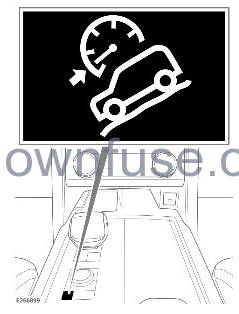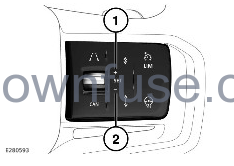
2022 Land Rover Discovery Hill Descent Control(HDC)

HILL DESCENT CONTROL (HDC)
Hill Descent Control (HDC) restricts the vehicle’s speed to a set limit when traveling downhill.
Do not attempt a steep descent if HDC is inoperative or warning messages are displayed. Doing so could lead to loss of vehicle control, resulting in vehicle damage, personal injury, or death.

The HDC button is located on the center console. The HDC button also controls the operation of the All Terrain Progress Control (ATPC) system. See ALL TERRAIN PROGRESS CONTROL (ATPC) OVERVIEW.
The button operates as follows:
- A first press of the button enables the HDC system.
- A second press of the button disables the HDC system and enables ATPC.
- A third press of the button disables ATPC.
The instrument panel displays a confirmation message and illuminates the HDC information lamp to confirm that HDC has been selected. See HILL DESCENT CONTROL (HDC) (GREEN).
- HDC is automatically selected by some terrain response driving programs.
- HDC remains selected for up to 6 hours after the vehicle’s ignition is switched off.
Press the HDC button a second time to deselect HDC. The instrument panel displays a confirmation message and extinguishes the HDC information lamp. If HDC is deselected while it is active, operation fades - out, allowing the vehicle’s speed to increase.

To adjust the vehicle’s rate of descent:
- Press and release the SET+ button to increase the vehicle’s speed in increments of 0.6 mph (1 km/h). Press and hold the SET+ button for larger increases, up to the maximum permissible speed.
- Press and release the – button to decrease the vehicle’s speed in increments of 0.6 mph (1 km/h). Press and hold the – button for larger decreases, down to the minimum permissible speed.
The instrument panel displays the current set speed and the range of set speeds available.
The maximum and minimum permissible speeds are dependent on the gear selection.
The vehicle’s speed only increases on a slope steep enough to increase momentum. Using the SET+ button may not increase the vehicle’s speed on a gentle slope.
Pulsation may be felt through the brake pedal if the brakes are used when HDC is active. HDC operation resumes when the brake pedal is released.
HILL DESCENT CONTROL (HDC) LIMITATIONS
- Hill Descent Control (HDC) does not operate when Park (P) is selected.
- HDC operation is suspended if the vehicle’s speed exceeds 30 mph (50 km/h). In this instance, the instrument panel display turns gray and warning messages are displayed. The HDC information lamp also flashes.
- HDC operation is disabled if the vehicle’s speed exceeds 50 mph (80 km/h). The instrument panel displays a message and extinguishes the HDC information lamp.
If a fault is detected while HDC is active: - HDC operation gradually fades out.
- The instrument panel displays a warning message.
- The HDC information lamp flashes.
Contact a retailer/authorized repairer as soon as possible if an HDC fault occurs.
GRADIENT RELEASE CONTROL (GRC)
- Gradient Release Control (GRC) improves the vehicle’s ability to smoothly pull away from a standstill when on an incline or decline. GRC achieves this by automatically controlling brake operation once the brake pedal is released. No driver intervention is required.
- GRC operates when forward or reverse gears are selected.
- GRC also operates if the brakes are applied while Hill Descent Control (HDC) is active. See HILL DESCENT CONTROL (HDC).
- GRC does not operate if the terrain response sand driving program is selected. See SAND.
BRAKE TEMPERATURE
In extreme circumstances, prolonged use of the Hill Descent Control (HDC) system may cause excessive brake temperatures. In this event, the instrument panel displays a warning message, indicating that the HDC system is temporarily unavailable. HDC operation fades out and becomes temporarily inactive. When the brake temperatures have returned to normal, the instrument panel warning message extinguishes and HDC operation resumes.
